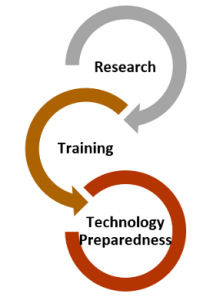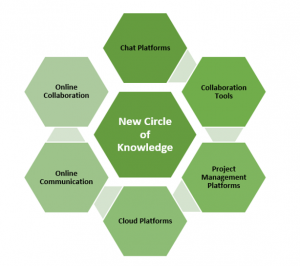As the world moves from complete lockdowns to ‘circuit-breaker’ lockdowns and ‘bio bubbles’, a lot has changed in the development sector. Think tanks, that are so integral to the sector, were thrown out of gear as the COVID-19 crisis stumped the world. For organisations (like think tanks) that relied heavily on in-person interactions, especially at the ground level, the sudden switch to a work-from-home model was somewhat disconcerting.
 The pandemic accelerated the pace of digitalisation, making ‘online’ the new normal. Employers and employees scrambled to retain their productivity levels as they swapped office cubicles for kitchen tables.
The pandemic accelerated the pace of digitalisation, making ‘online’ the new normal. Employers and employees scrambled to retain their productivity levels as they swapped office cubicles for kitchen tables.
So, in terms of skills and skilling requirements, where do these organisations find themselves post the pandemic?
The disruption, though not tectonic, has essentially been in three key areas: technology preparedness, research and training.
Finding their feet on tech turf
The most immediate jolt was felt in the area of technology preparedness. While some tools and technologies were being used by almost all organisations, this definite and unforeseen shift in working models took many think tanks by surprise.
In the initial days, remote work meant that the staff needed to find their own way through the maze of collaboration tools that would enable them to take their work online. It was clear that those lacking digital skills risked finding themselves being rendered redundant. There was also a sense of isolation, no doubt.
‘We see a learning curve in the use of technology and its adoption. There is a need to adapt to new tools and this is a work in progress’, says Kavitha Nair, HR manager at the Center for Study of Science, Technology and Policy (CSTEP).
Not all think tanks were at the same level of technology adoption and there was a need to quickly groom employees across the board to manage and use technology for work.
This will continue to be a challenge as think tanks manage tech disruptions on fronts such as data and information security, future emergency responses, online events, and improving productivity.
Building a robust tech infrastructure and bridging digital skill gaps in all departments have, thus, emerged as top priorities for most think tanks as they recognise that organisations or employees without digital knowhow will have no place in this post-pandemic world.
Starting with getting the staff acclimatised to basic virtual skills such as online team calls via videoconferencing tools, participating in webinars, and use of technology platforms, the focus will be more in this area as technology dependence is only going to rise. Today, every person working in a think tank should know how to use chat platforms in lieu of emails to ensure faster and real-time collaboration. In-person collaboration is largely passé.
Remote project management skills have emerged as one of the key job requirements for employees in think tanks today. Dr Annapoorna Ravichander, executive director at the Public Affairs Foundation (PAF), explains:
As technology overshadows people dependencies, work is getting more process driven than people driven. The pandemic has made us see the importance of technology like never before

Supporting this view, in a recent World Bank event on Enhancing Digital Capabilities in A Post-COVID-19 World, speakers asserted that digital
capabilities should be considered as building blocks for improved service delivery as well as greater transparency and accountability.
From an organisational perspective, the three pressing areas to focus on are: online collaboration, online communication, and use of project management platforms. For think tanks to be resilient and pandemic proof, digital transformation and having robust IT departments are not just an option but an imperative.
Changing ‘ground’ realities for research
The pandemic brought one part of think tank work to a screeching halt – primary or field research.
Researchers realised that many of the traditional methods had to be shunned to stay relevant. Shamika Ravi, a non-resident senior fellow of the Governance Studies programme at the Brookings Institution, Washington DC, points out:
This disruption will mean we, in the research community, will have to be far more innovative. You can do online and telephone surveys. But in India, while access to digital has improved, it is still very limited. For instance, how do you talk to a casual labourer or a construction worker on the phone for a survey?
You can’t change skillsets in the short term. In the research space, skillsets are not that elastic. Reskilling will take time. It will take several years to meet this new demand where you have a new group of people who are trained in either technology or health. Until then, it is the existing researchers who will have to do this instead of waiting for fresh batch of researchers to come and take over.
She also observes that the research questions are changing too, especially in areas of education and health. To be able to address these new questions, researchers need to pivot. The changes on the research front, Dr Ravichander explains, would only sharpen the niches, with the attention gravitating towards specific SDGs, such as those related to gender, livelihood, education and health.
The COVID-19 crisis has, in a way, built some invisible barriers between researchers and the community. At least, for a while. The earlier in-person interactions with community members, ground-level service implementors or members of the local self-governance systems are somewhat a thing of the past.
It will be a while before people can again best leverage field research. And, the researchers recognise that change. Some experts propose a bottom-up approach that would entail creating awareness about the changing scenario, fine-tuning existing service delivery systems and the like.
Re-aligning skills is the need of the hour, as many of the traditional methods of doing research-based work, in particular, have taken a hit. ‘Policy researchers have to be able to provide timely, contextual and credible policy recommendations to the government, and also make the case out in public discourse. For this, policy researchers must develop skills in using social media, video making, podcasting and public engagement as these are now hygiene factors’, says Nitin Pai, co-founder and director of the Takshashila Institution, an independent centre for research and education in public policy. Policy analysts should be able to understand and execute data visualisations, he adds.
To get through the pandemic, and to ‘make sense of the world around us’, Shamika Ravi proposes that researchers use alternate sources of data such as tone data or mobility data, as their traditional tools have been disrupted. She holds that with primary surveys taking a pause, having access to real-time data, especially in countries like India, is difficult.
As with research, there is also a need to reimagine training. Some earlier modules are now passé. Some think tanks have started re-designing their training programmes, especially on use of social accountability tools or field research. Trainers now must learn to think on their feet and find new ways to connect with the audience amid the inevitable online glitches.
As think tanks buckle up for the next 8–12 months, reimagining skills to stay relevant is the new normal.

